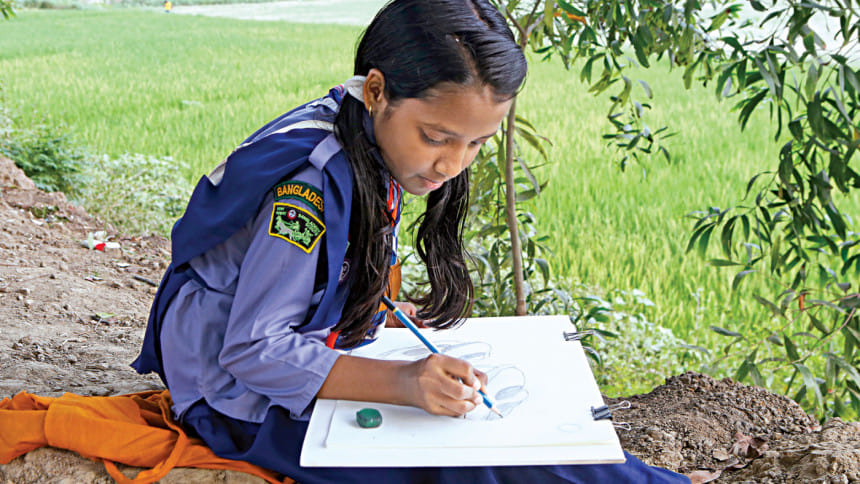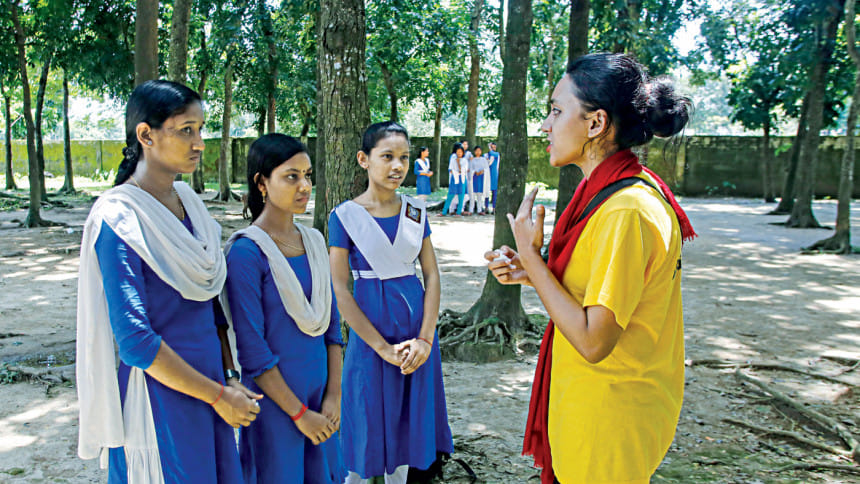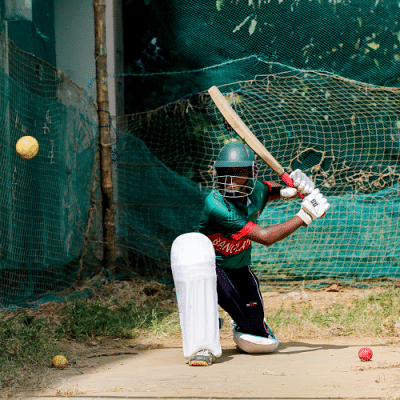The State of Extracurriculars

What comes to your mind when you read the words "extracurricular activity"? Do you think about university admissions and job prospects, or do you think of a way for you to discover and hone activities you're interested in? If it is not the latter, then we may have a problem.
An extracurricular activity (ECA) can denote anything you do outside of your central education as long as you are not awarded school credits for it. So yes, debate, graphic design, singing, playing a sport, researching, summer programmes, volunteering, and sewing costumes for cats are all ECAs. And now, more than ever, you can pursue as many or as few as you like.
The ECA scene in Bangladesh has changed drastically over the past few years, and with it, our feelings towards them. Whereas, once upon a time, the list of activities available to us was much shorter and access to it was limited to only those who could participate, a surge in accessibility and increase in discovery has changed the face of extracurriculars. Through the power of technology, you can now do much more from the comfort of your home than you could, say, 15 years ago. YouTube tutorials are available for free on absolutely any skill, but if you want a more hands-on experience and exposure to it outside your bedroom, you can most certainly hire a tutor or take classes.

Because social media encourages people to showcase their work, an increasing number of people are now motivated to improve their skills in the arts, primarily music, dance and visual arts, in order to share their talents with the world. On the other hand, the increased frequency of competitions, seminars, workshops, and other resources aid students who want to pursue debate, project development, quizzes, and other interactive activities. Whatever it is that students work on, most gain at least some level of social skills.
When you take up an activity and dedicate a considerable amount of time and effort behind it, you are extremely likely to come out of the other side not only as a master of said skill but also as the owner of various other qualities. For example, playing a team sport is associated with having good hand-eye coordination, sharp reflexes and teamwork skills. Spending a lot of time on certain activities that you are passionate about also shows your dedication, commitment to and specialisation in that activity. This is what recruiters and admission officers want to see.
Somehow, this message gets lost in translation and most students end up seeing ECAs as merely a method to boost their resumes. As university applications and job prospects see more and more competition, students fight tooth and nail to stand out because they believe ECAs are the way to do so. Instead of finding and focusing on the activity that they are most passionate about, they run after a dozen activities they care less about and do not really want to work on.
Take, for example, the increase in the number of youth-led non-profit organisations in Dhaka. While they all may have started with good intent, some have spiralled into a force that debilitates the authenticity of volunteer work. Because there are so many organisations present today, authenticity becomes a big issue. Of course, you have to also acknowledge the ones that do meaningful and impactful work in the spirit of helping our country. However, a small number of these organisations were started by students who wanted to look philanthropic to universities and recruiters, and they stopped operations once they were in a position where they no longer had to care about doing charity work.
I suppose the blame isn't totally up to students either; we have somehow perpetuated a culture where not only do students not have enough excitement to pursue ECAs to learn, but they don't have the time either. With their day split between school and coaching, there is seldom time for students to pursue anything other than academics. The notion that students should be dedicating every waking hour to academics is embedded in our society. My 9th grade Math tutor, disappointed in me for going to Model UN conferences, would tell me, "You're in 9th grade now. The only thing you should be focusing on is your O Level exams."
This ideology is harmful. Where adults should be encouraging us to pursue interests outside the four walls of academia, they discourage us instead. It's not just teachers, either.

"When I was in 11th grade, my mom wouldn't let me go to debate tournaments because they would end late at night. It was so discouraging—I had the potential to become a good debater," says Nishat Khan, currently pursuing an undergraduate degree at North South University. This isn't the only time societal expectations have been a hindrance either. Countless female students across multiple schools all over the country note how they're discouraged from participating in any physical sports at all, let alone any other kind of activities.
When asked about diminishing student involvement in extracurricular activities and school-administered programmes, Roksana Zarin, Principal at International Hope School Bangladesh, responded, "Because students value their board examinations a lot, even if they are interested in sports and other activities, they cannot find the time to fit it into their schedules because they are unable to balance school and coachings. So, even if sports and other classes are arranged for them weekly, they choose to neglect them. Moreover, I think that because sports scholarships are not a renowned concept in Bangladesh, there's less importance towards these aspects."
Why are these notions harmful for young students? In order for us to promote the idea that picking an unconventional career path is okay, it's important to teach the youth to venture out and find what they're passionate about. That means delving deep into the arts, sports, music, and other activities. It's okay if they're not good at any of these, either; the point is to provide a safe space away from your study tables where you can wind down. The point is to see what you enjoy the most, even if you're not particularly good at it.
However, while students face increasing resistance, and fight to find time to engage in activities, many are pushing themselves to get more involved despite the hurdles.
"The increase in community engagement over the past few years has been incredible. When I first started high school, there were huge gaps in the kind of community service available to the youth, which led to the formation of many organisations. Over the years, we've seen more young people creating their own opportunities. All my peers are actively engaged in work they're passionate about, and that's heartwarming to see," says Shebonti Khandaker, co-founder and CEO of Nirmegh, a youth organisation.
ECAs are integral to the journey that proves that an unconventional career path is more than okay; it's also the most risk-free way of finding out what you enjoy. But even if one chooses to pursue a conventional career path, the skills they learn will be crucial to their success. The best place to start your ECA journey would be at school, so that when you eventually start applying for jobs, you have something to show for your skills.
Keep in mind, however, that it's not just about having experience, either. It's also about learning through these experiences; everything in life shouldn't be about a piece of paper with your name on it. The world is for you to explore, and if you don't delve outside of academic activities, you haven't even come close to conquering it.
Nabiha runs every day. Out of time, ramen and K-drama episodes. Send her an email at [email protected] to join her on this rigorous workout.
Fariha enjoys binge-watching movies in the dark vicinity of her bedroom. Send her memes at [email protected]

 For all latest news, follow The Daily Star's Google News channel.
For all latest news, follow The Daily Star's Google News channel. 



Comments